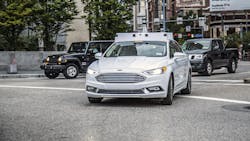Poll: Public concerned about, wants controls on self-driving vehicles
Automakers have been focusing more and more on driverless cars and trucks "as a panacea" for highway deaths and injuries, but the federal government needs to set requirements and standards for these vehicles to ensure safest operation. So argues Advocates for Highway and Auto Safety, which found the American public wants such standards in a poll it conducted on autonomous vehicles.
Cathy Chase, president of Advocates, claimed that legislation in the U.S. House and Senate seeks "to accommodate the industry's desire to remove regulatory roadblocks and minimize reporting requirements that they find objectionable." She was referring to the House's SELF DRIVE Act, H.R. 3388, and the Senate's AV START Act, S. 1885.
The bills "lack basic safeguards," Chase argued, and the U.S. Dept. of Transportation's (DOT) so far only voluntary guidelines issued for driverless vehicles aren't enforceable. Across the nation, according to Advocates' poll of 1,005 adults in the U.S., about 64% said they're concerned about sharing the road with self-driving vehicles.
A larger amount — three out of four — said they'd be uncomfortable with automakers disabling vehicle controls like the steering wheel and brake/gas pedals without review and approval from DOT to do so. Advocates blasted the Senate's bill for including a provision that would allow automakers to do exactly that.
In particular, the Senate bill specifies that a prohibition on disabling driving controls:
"shall not apply to a manufacturer that intentionally causes a steering wheel, brake or accelerator pedals, a gear shift, or other feature or element of design related to the performance of the dynamic driving task . . . to be temporarily disabled during the time that an automated driving system is performing the entire dynamic driving task."
The group also expressed concern over a lack of cybersecurity/computer standards for autonomous vehicles as well as the possibility that they could be over-commercialized as companies rush to cash in on shopping, entertainment and other functions in them. In the poll, 81% of respondents supported enacting cybersecurity rules to protect driverless vehicles from hacking.
That mirrors a potential problem with self-driving vehicles often voiced in the trucking and automotive industries: that these vehicles could be hacked and taken control of, possibly in a theft or used as a weapon or some other criminal purpose. Asked whether the group believes that higher or additional standards should be required for autonomous heavy trucks, since their potential for harmful use would be greater, Advocates said its goal is just getting any solid cybersecurity standards in place.
"Cybersecurity is a concern for all modes of autonomous transportation including passenger cars and large trucks. What we want are strong cybersecurity requirements at all, because currently there are none," Shaun Kildare, the group's director of research, told Fleet Owner.
"Whether it is one person's life in a single passenger car or the threat of a truck being used in an attack on multiple people, cybersecurity safeguards should prevent that occurrence," he added.
It's also part of the difficulty in enacting standards via the legislative process in this case. The technology being used in autonomous vehicles is advancing and changing so rapidly that it's difficult to keep up.
One example is a system from Phantom Auto that can allow a remote driver to take control of an autonomous vehicle. Such a system might provide a "fail safe" takeover where the vehicle could at least be stopped, as long as it also can be safeguarded from cyberattack.
About the Author
Aaron Marsh
Aaron Marsh is a former senior editor of FleetOwner, who wrote for the publication from 2015 to 2019.
